Products You May Like
LONDON — The announcement that Arsenal had agreed a 12.5 percent pay cut with their playing staff initially appeared to be a victory for everyone involved. Here was an example of a group of highly-paid and much-storied footballers, routinely maligned for existing in a bubble of exorbitant wealth, recognising the reality of the world and making an economic sacrifice for the greater good during exceptional times.
In doing so, the Gunners became the first Premier League club to confirm a salary reduction as opposed to a deferral, setting an example to others by demonstrating both the severity of the financial damage this coronavirus pandemic will likely inflict and an admirable collective willingness to face that challenge. By saving a maximum of around £20 million over the next 12 months — their salaries are repaid in full if they qualify for the Champions League or 7.5 percent is returned in reaching the Europa League — the club’s non-playing staff were less likely to be furloughed.
– Stream new episodes of ESPN FC Monday-Friday on ESPN+
– Stream every episode of 30 for 30: Soccer Stories on ESPN+
And yet, the negotiations also shone a light on the internal tensions in the Arsenal squad that pose one of the biggest sporting tests to head coach Mikel Arteta as he rebuilds this team.
Contract negotiations have long been an issue for the Gunners. It’s why the club sought to bring additional expertise on board, including former Team Sky lawyer Huss Fahmy and Raul Sanllehi from Barcelona. Yet despite the goal of injecting greater diligence and ruthlessness into their operations, the Gunners conducted their pay-cut conversations against a backdrop of uncertainty surrounding the futures of several influential players.
Upon taking the helm after chief executive Ivan Gazidis’ departure for AC Milan at the end of 2018, Arsenal head of football Sanllehi and managing director Vinai Venkatesham underlined how they wanted to establish fresh business practices following the end of Arsene Wenger’s 22-year reign and a large-scale restructuring. “Internally, we are calling this period ‘The New Chapter,’ which I think says a lot,” Sanllehi claimed in November 2018. That sea change had multiple components, chief among them a need to improve the club’s methodology around contract negotiations, having lost an array of talent on unfavourable terms. In 2019, Aaron Ramsey joined a painfully long list at the end of last season after the club withdrew a longstanding offer to end what they privately vowed would be the last stalemate of its kind.
“You should try to always avoid going into the last year of a contract for many different reasons, from the club’s side and also for the player,” Sanllehi said. “We will try to get clarity earlier.”
Yet a cloudy picture persists and more than a year later, that search for clarity continues. Pierre-Emerick Aubameyang, Bukayo Saka and Alexandre Lacazette are among a number of players facing uncertain futures, the metaphorical clock ticking and speculation growing over exactly the sort of cut-price departure Arsenal wanted to avoid. Aubameyang and Saka are out of contract in 2021, Lacazette in 2022.
– Sources: Ozil facing uncertain future as contract talks stall
– Laurens: Inside Arsenal players’ pay cut negotiations
A partial explanation for the delay in tying players down can be found in the upheaval caused by Unai Emery’s departure in November. The Spaniard’s tenure unravelled to an alarming extent but the club were so reluctant to sack him that there was no immediate replacement lined up. The club opted to give club legend and assistant first-team coach Freddie Ljungberg a chance to prove himself. The Swede had an excellent relationship with Arsenal’s young players from his work as U-23 manager but failed to address the tactical issues that contributed to Emery’s departure. Having held an interest in Arteta when Wenger departed, the Gunners opted to appoint the Spaniard in mid-December.
But as the coronavirus spread across the globe, causing mass disruption to daily life and presenting unprecedented challenges, discussions inside the club turned to cashflow and Arsenal found themselves in the awkward position of having to simultaneously present competing arguments to certain players. The spirit of those conversations was awkward: We need you to take a pay cut to safeguard the club’s future, but also believe us when we say we’re in a position to compete for trophies in future… so why not sign a new long-term contract?
The most obvious example of a player caught at the crossroads is Pierre-Emerick Aubameyang, who will have one year remaining on his existing contract whenever the current season ends. The striker turns 31 in June and his next contract will probably be the last big deal of his top-flight career. He’s in a strong negotiating position, having shared the Premier League Golden Boot with Mohamed Salah and Sadio Mane last season before backing that up with 17 goals this term, second in the standings behind Leicester’s Jamie Vardy.
Aubameyang’s haul is especially impressive given the team’s broader struggles under Emery. The Gunners’ all-time record goalscorer, Thierry Henry, echoed the sentiments of many supporters when reflecting in December: “Without the goals of Aubameyang I don’t know where we would have been right now.”
No other Arsenal player is in double figures, with Lacazette next best on seven league goals and Nicolas Pepe with four. To underline Aubameyang’s talismanic effect on the squad, Aubameyang was given the captain’s armband when Granit Xhaka was demoted following an altercation with supporters. The striker used his programme notes in January to scotch rumours of a possible departure, adding “I am committed to it and desperate to bring it back to the top, where it belongs.”
However, there are some senior figures at the club who, while welcoming that public show of loyalty, would have liked to have seen a stronger indication from Aubameyang that he is ready to sign a new deal. Talks have been delayed as a result of the coronavirus, but already it was understood that Aubameyang’s position involved waiting to see whether the club qualified for the Champions League and how well-placed they were to fight for silverware during the theoretical apotheosis of his career.
All of which is difficult to square with Arsenal being the only club to take a pay cut — and one lasting 12 months at that, rather than the three or four-month deferrals reported at other clubs. Aubemeyang’s future is undecided but other clubs including Chelsea, Barcelona and Inter Milan sense an opportunity he could be tempted away.

Saka is at the opposite end of the spectrum in terms of age and influence, but finds himself pondering a similar dilemma as Aubameyang. The 19-year-old has been one of Arsenal’s success stories this season, breaking into the first team with maturity, consistency and quality — form made all the more remarkable by doing so largely while playing out of position at left-back rather than in his preferred guise as a winger.
Like Aubameyang, Saka will have one year left on his deal and with just 26 first-team appearances under his belt, he’s already attracted interest from a host of clubs including Borussia Dortmund in addition to being namechecked for a future international call-up by England head coach Gareth Southgate. He joined Arsenal at the age of nine and is deeply fond of the club, but rivals will make a compelling case that they’re better positioned to aid his development.
Saka earns a fraction of Aubameyang’s £200,000-a-week wage and would therefore feel the pinch more acutely over the next year, but this isn’t about the money as much as it is ambition.
Arsenal undoubtedly need considerable investment to help them compete again for the Premier League and Champions League. Sanllehi and Venkatesham are engaging characters with the club’s best interests at heart, but do they have the resources to create the conditions for the Gunners to challenge? And if not, will the owner buck a trend and invest to help bridge the gap?
These are the types of issues Mesut Ozil felt did not get satisfactorily answers before declining to join his teammates in taking a pay cut. Talks are ongoing with Ozil and at least two other players, who are all open to finding a solution, but no agreement is close.
Ozil’s £350,000-a-week contract has been a financial strain on the club and often hard to justify, particularly when the midfielder was frozen out under Emery. Rather than that figure hailing the dawn of a new era in which the club could rival the biggest salaries around, it remains an outlier in the first-team squad to this day. Other players have referenced it as a benchmark in negotiations. Arsenal have not played a Champions League match since Ozil signed that deal in January 2018, and a lack of income from Europe’s premier competition has compromised any chance of offering other players a similar wage.
It’s perhaps little surprise Ozil has yet to be offered any sort of extension, even one on reduced terms. The German midfielder was free to leave last summer, but no club could match his salary. Although he never agitated for a move and has enjoyed a revival under Arteta, it feels as though both Arsenal and Ozil have reached a point where their association is no longer mutually beneficial.
After seven years at the club — eight if Ozil sees out his contract to its conclusion — it will be a landmark moment for the Gunners. Those with intimate knowledge of the player insist his motivation in rejecting a pay cut is not financial — he gives away more than £2m per year to charitable causes — but a question of aspiration, aptitude and intent.
Those questions have been asked of owner Stan Kroenke for a long time prior to the coronavirus pandemic. They will be by prospective new signings, too.
Shkodran Mustafi, David Luiz, and Sokratis Papastathopoulos all have deals that expire in 2021. The former has been a divisive figure for some time, while the latter pair are believed to have options in their existing agreements to extend by a further year; all will need addressing soon. Lacazette has two years remaining, giving the club a little more insulation against external market forces, but the French striker has not always looked entirely happy in north London and another tough decision over his future sits on the horizon unless there is a change in mood around the club.
Of course, Arsenal are not alone in facing these challenges. Chelsea were in discussions over a 10 percent cut for their first-team squad but failed to reach an agreement. Tottenham and Liverpool were forced into reversing their decision to furlough non-playing staff and neither have secured a deferral or cut from their players as yet. At the time of writing, Manchester United insist they are not considering reductions of deferrals, but executive vice-chairman Ed Woodward claimed last week that the economic impact would affect their ability to compete in the transfer market when football resumes. And if that is true of a financial behemoth like United, the rest of the Premier League really is in trouble.
The lasting effect of coronavirus on football is a long way from being known, but as clubs adjust to a future not yet fully formed, a familiar issue plagues Arsenal’s path.
